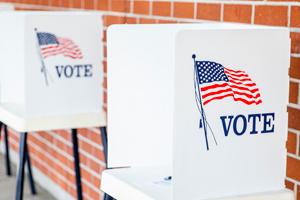Research
Democracy Denied? Allan Lichtman on the Troubled History of Voting Rights

In the movie Selma, an African-American woman tries to register to vote. A local official proceeds to grill the resident—played by Oprah Winfrey—about civic minutia no one in the state could possibly know, such as the names of all 67 county judges.
Many schoolchildren learn about those voter suppression efforts in early 1960s Alabama. But, according to Allan Lichtman’s new book, The Embattled Vote in America: From the Founding to the Present, these are pervasive injustices that transcend region and era.
In fact, Lichtman argues, we’ve never really had a “right” to vote in this country. “It’s harder to vote in the United States than virtually every other advanced democracy,” says Lichtman, a distinguished professor of history in American University’s College of Arts and Sciences. "Because there isn’t a constitutional right to vote, historically, huge segments of the American people were denied voting rights: African Americans, Native Americans, women. Today we don’t have such blanket restrictions, but we have lots of ways in which we impede the right to vote.”
Flawed by Design
If millions of Americans cherish democracy, how did this happen? Lichtman says the problem stems from the constitutional framers’ decision to leave voting to the states. And those framers were all white men—mostly elite slaveowners, land speculators, lawyers, and businessmen.
“They loved the people, but not all that much. They distrusted the people,” he explains. “So, they believed that the vote should be limited to those who held property, or at a minimum, paid taxes. They believed only those people, for the most part, had the independence and the strength of mind to resist voter fraud and cast a wise vote.”
Though framers could have enshrined “economic qualifications” for voting into the Constitution, they worried this would jeopardize a ratification process that needed support from three-fourths of the states. With this uncertainty, Lichtman says, they gave states the power over voting and the Constitution is virtually silent on the issue.
States used their discretion on voting to limit the franchise to whites. “Race has always been at the center of voting in America. In the 19th century, states either loosened or, for the most part, entirely eliminated economic qualifications, but they moved toward white-only voting,” he says.
The Importance of Affirmation
After the bloody Civil War, the abolition of slavery, and President Abraham Lincoln’s assassination, the Republican “party of Lincoln” sought to expand voting rights through the 15th Amendment.
But Lichtman notes a key problem that arose. With knowledge that most states still restricted nonwhite voting, Congress decided that an affirmative “you have a right to vote” would never get ratified.
“The consensus was that this was going too far. And the best they could do was a prohibition on denying the right to vote on the basis of race,” he says.
While women suffragists successfully fought for voting rights, the 19th Amendment is written the same way.
“Since the Constitution, every subsequent amendment is phrased negatively in terms of what states can’t do. So, you can’t deny the right to vote, according to race or gender or age. But to this day, none of the amendments affirmatively define a right to vote.”
Voter IDs, Voter Fraud, and Electoral Math
In recent years, GOP-controlled state legislatures have pushed for controversial voter ID laws. They believe voter ID requirements protect electoral integrity, but civil rights groups have attacked them as discriminatory measures aimed at suppressing the vote. Advocates say voter ID laws combat voter fraud, but Lichtman contends that numerous studies have found voter impersonation or fraud to be vanishingly small.
“Voter fraud has been a red herring for hundreds of years. It was trotted out to justify denying the vote to women and denying the vote to people of color. The argument was, ‘Well, these would be bought voters. They’re not really independent. They’re not strong of mind. And they’re going to become instruments of voter fraud.’ There was no evidence for that at the time, and there’s been no subsequent evidence,” he says.
The Supreme Court has permitted states flexibility on felon disenfranchisement matters, and it recently upheld Ohio’s voter roll “purge” law. Lichtman expects the High Court to continue allowing rigid voting standards.
“We are in danger of becoming a two-nation country when it comes to voting rights. A blue state nation and a red state nation, with very different rules and procedures for voting. It’s pretty shocking,” he says. “As the federal judiciary becomes more conservative, more action on voting rights could shift to the states.”
Lichtman sees some encouraging signs on that front. For instance, a grassroots movement in Florida got an anti-gerrymandering provision in the state’s constitution. But he also thinks these battles will continue, and it’s basically an issue of voter turnout and math.
“It used to be the Democratic Party that was the party of voter suppression. Today, it’s the Republican Party. It’s pretty simple. What is the base of the Republican Party? Older, white Christian men. You can’t manufacture more older white Christian men—a shrinking part of the electorate. But what you can do is try to restrict the vote of the Democratic base, which is younger, minority, nonreligious,” he argues.
Past is Prologue
The AU professor started working in this field by accident: When 1980 independent presidential candidate John Anderson was attempting to get on state ballots, Lichtman was asked to write a history of third parties in the US. He’s testified in some 90 voting rights cases, including one in Alabama’s Dallas County—home of, you guessed it, Selma.
This isn’t ancient history, Lichtman explains, but an evolving issue that needs increased attention. “We are at another pivot point in our history where our precious right to vote hangs in the balance. Every American needs to understand that our vote is precarious, and you can only retain your vote and your freedoms by action.”